2022中考英语一轮复习PPT课件 第7课时 Units 7—9,Book 8A
文档属性
| 名称 | 2022中考英语一轮复习PPT课件 第7课时 Units 7—9,Book 8A | 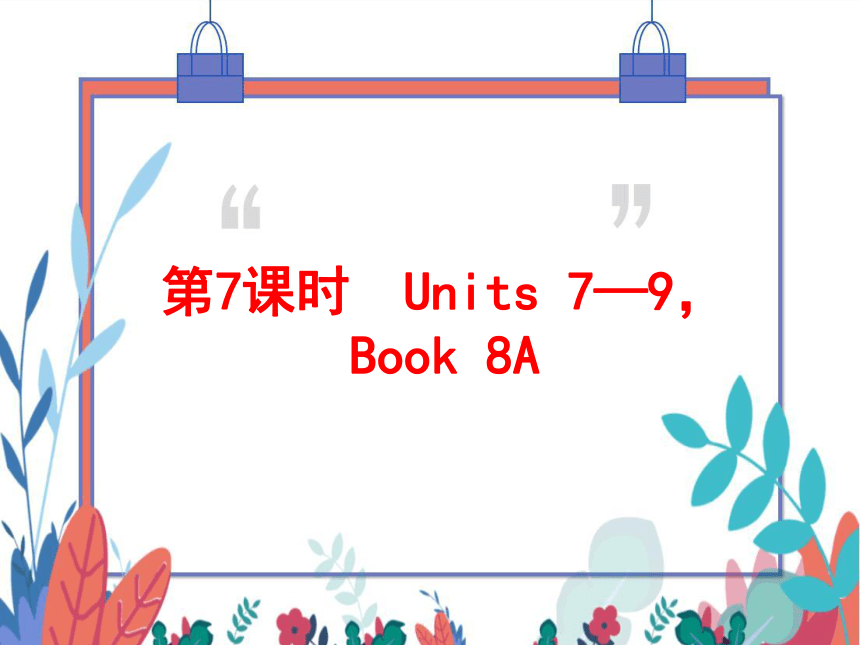 | |
| 格式 | ppt | ||
| 文件大小 | 817.0KB | ||
| 资源类型 | 试卷 | ||
| 版本资源 | 通用版 | ||
| 科目 | 英语 | ||
| 更新时间 | 2022-06-01 15:06:18 | ||
图片预览

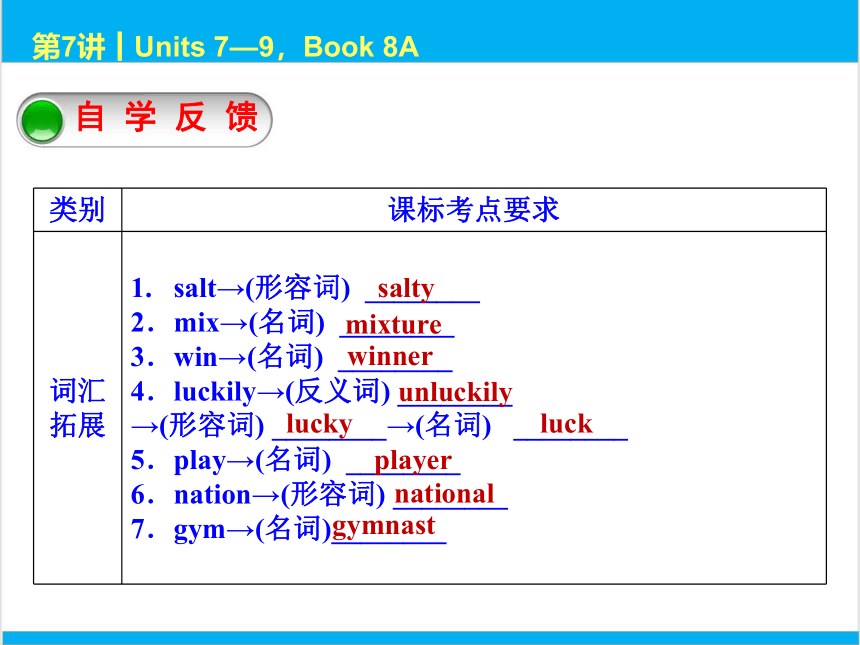
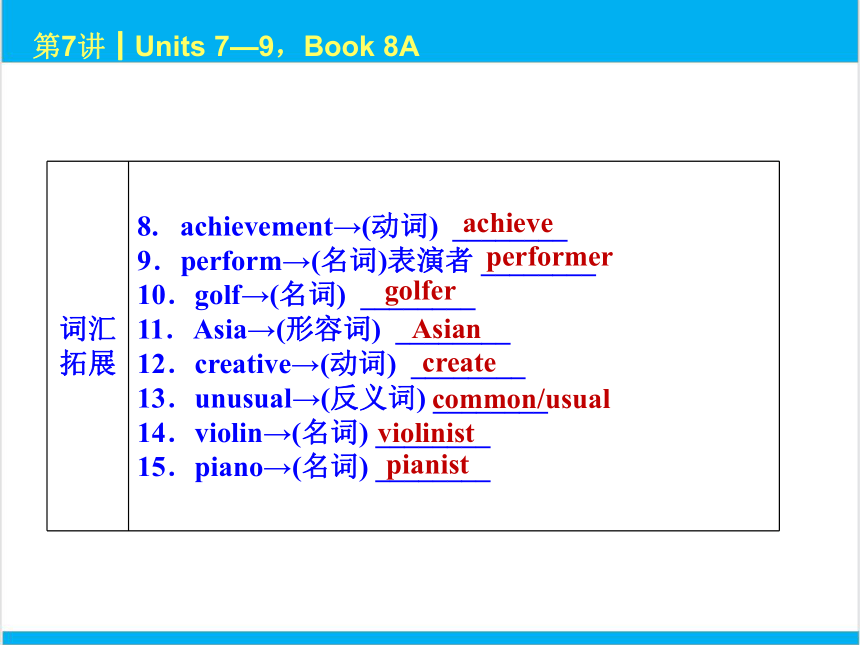
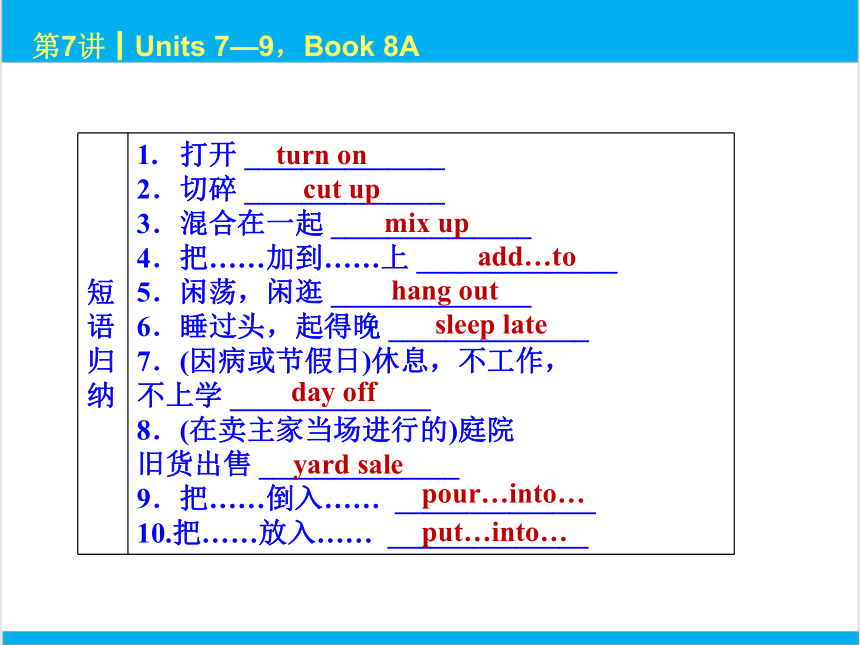
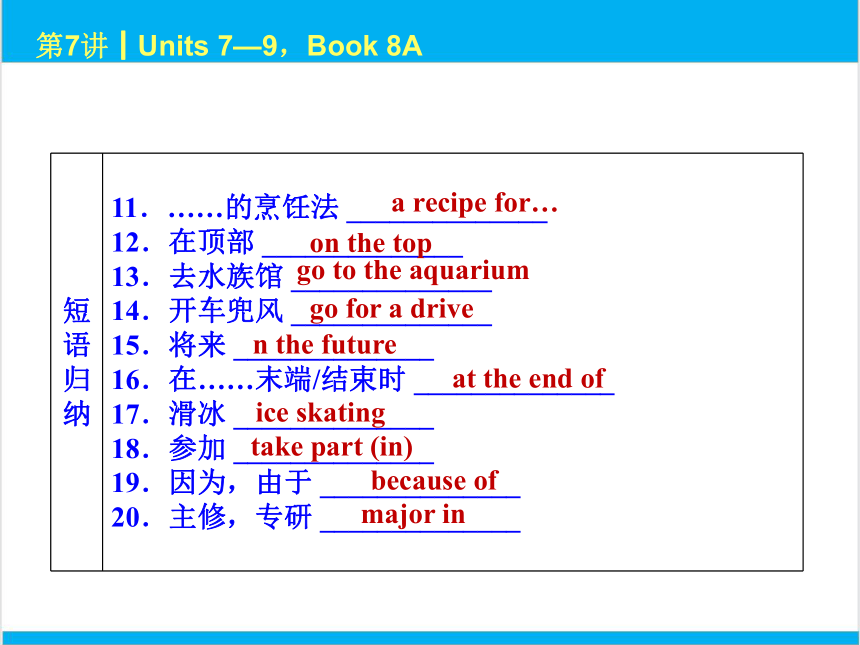
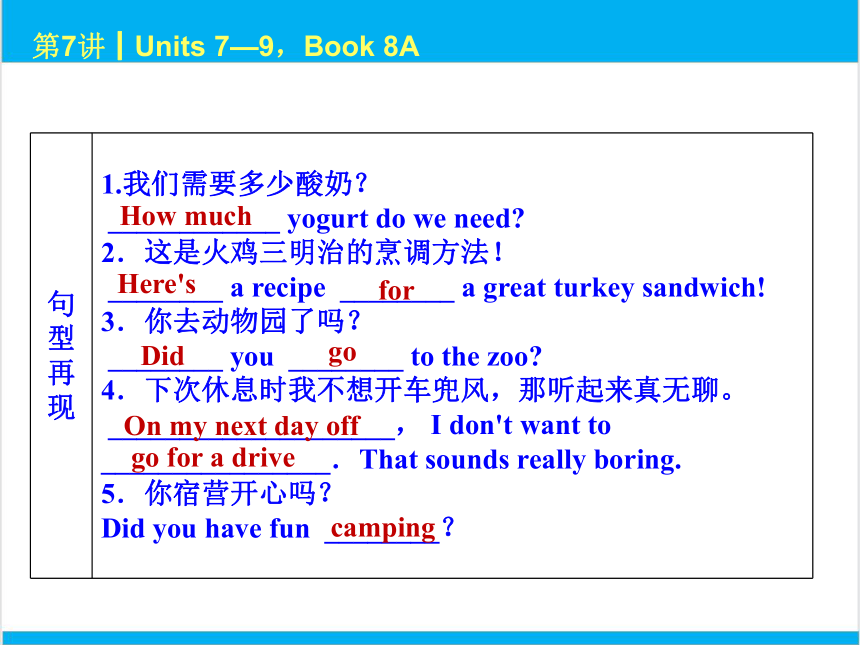
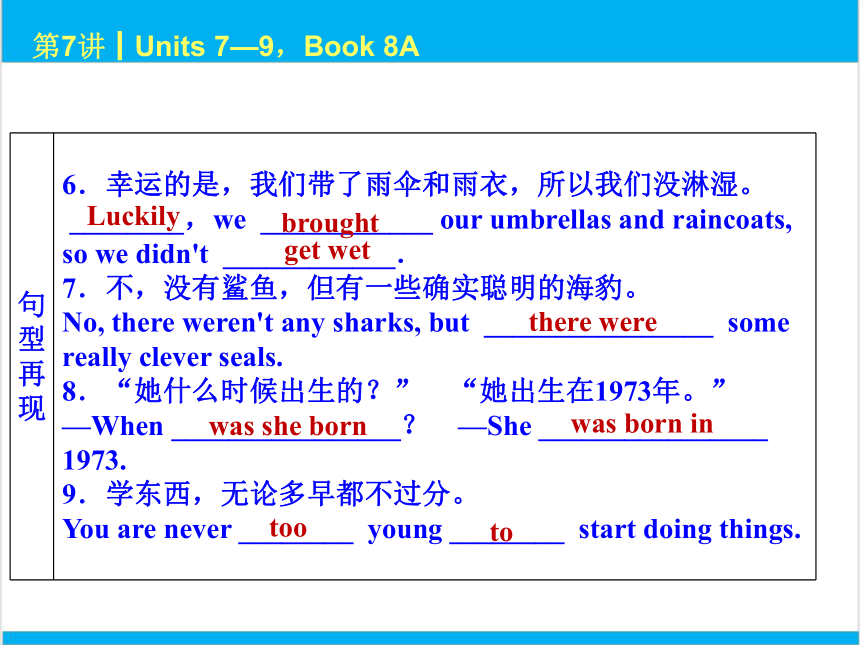
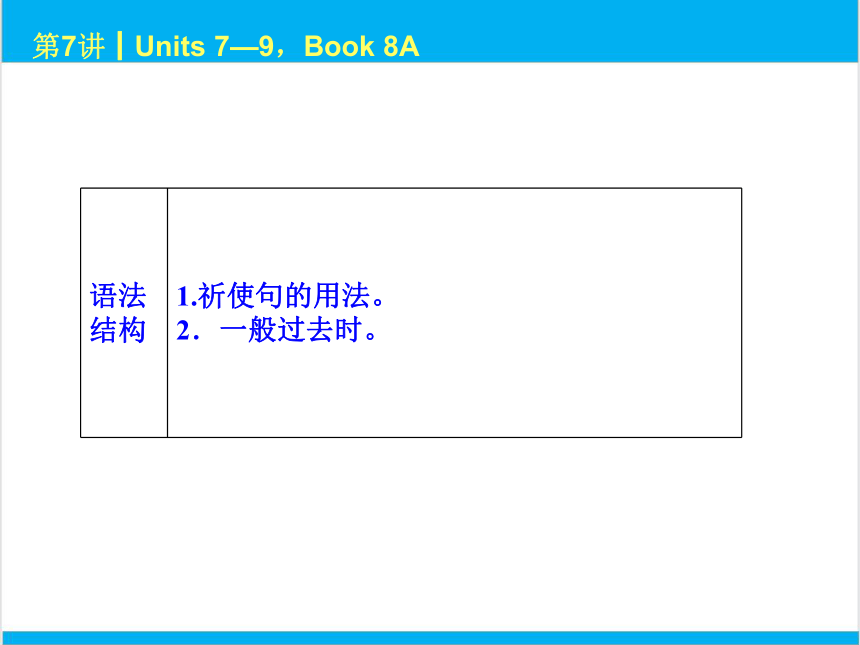
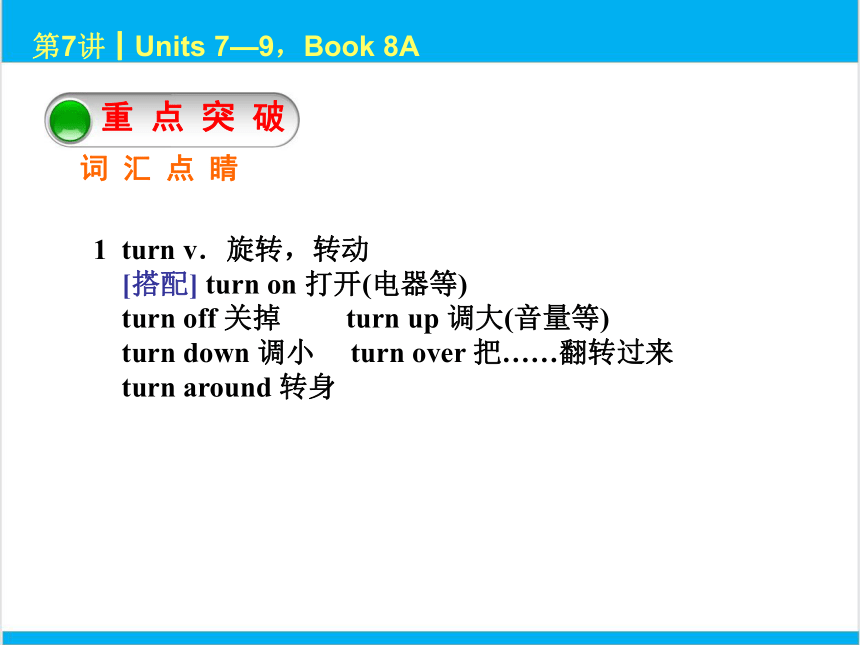
文档简介
(共28张PPT)
第7课时 Units 7—9,Book 8A
第7讲┃Units 7—9,Book 8A
自 学 反 馈
类别 课标考点要求
词汇
拓展 1. salt→(形容词) ________
2.mix→(名词) ________
3.win→(名词) ________
4.luckily→(反义词) ________
→(形容词) ________→(名词) ________
5.play→(名词) ________
6.nation→(形容词) ________
7.gym→(名词)________
salty
winner
unluckily
lucky
mixture
luck
player
national
gymnast
第7讲┃Units 7—9,Book 8A
词汇
拓展 8. achievement→(动词) ________
9.perform→(名词)表演者 ________
10.golf→(名词) ________
11.Asia→(形容词) ________
12.creative→(动词) ________
13.unusual→(反义词) ________
14.violin→(名词) ________
15.piano→(名词) ________
achieve
performer
golfer
Asian
create
common/usual
pianist
violinist
第7讲┃Units 7—9,Book 8A
短语
归纳 1. 打开 ______________
2.切碎 ______________
3.混合在一起 ______________
4.把……加到……上 ______________
5.闲荡,闲逛 ______________
6.睡过头,起得晚 ______________
7.(因病或节假日)休息,不工作,
不上学 ______________
8.(在卖主家当场进行的)庭院
旧货出售 ______________
9.把……倒入…… ______________ 10.把……放入…… ______________
turn on
mix up
cut up
add…to
hang out
sleep late
day off
yard sale
pour…into…
put…into…
短语
归纳 11.……的烹饪法 ______________
12.在顶部 ______________
13.去水族馆 ______________
14.开车兜风 ______________
15.将来 ______________
16.在……末端/结束时 ______________
17.滑冰 ______________
18.参加 ______________
19.因为,由于 ______________
20.主修,专研 ______________
a recipe for…
on the top
go to the aquarium
go for a drive
n the future
at the end of
ice skating
take part (in)
because of
第7讲┃Units 7—9,Book 8A
major in
第7讲┃Units 7—9,Book 8A
句型
再现 1.我们需要多少酸奶?
____________ yogurt do we need
2.这是火鸡三明治的烹调方法!
________ a recipe ________ a great turkey sandwich!
3.你去动物园了吗?
________ you ________ to the zoo
4.下次休息时我不想开车兜风,那听起来真无聊。
____________________, I don't want to ________________.That sounds really boring.
5.你宿营开心吗?
Did you have fun ________?
How much
Here's
for
Did
go
On my next day off
go for a drive
camping
第7讲┃Units 7—9,Book 8A
句型
再现 6.幸运的是,我们带了雨伞和雨衣,所以我们没淋湿。
________,we ____________ our umbrellas and raincoats, so we didn't ____________.
7.不,没有鲨鱼,但有一些确实聪明的海豹。
No, there weren't any sharks, but ________________ some really clever seals.
8.“她什么时候出生的?” “她出生在1973年。”
—When ________________? —She ________________ 1973.
9.学东西,无论多早都不过分。
You are never ________ young ________ start doing things.
Luckily
get wet
brought
there were
was she born
was born in
too
to
第7讲┃Units 7—9,Book 8A
语法
结构 1.祈使句的用法。
2.一般过去时。
第7讲┃Units 7—9,Book 8A
词 汇 点 睛
1 turn v.旋转,转动
[搭配] turn on 打开(电器等)
turn off 关掉 turn up 调大(音量等)
turn down 调小 turn over 把……翻转过来
turn around 转身
重 点 突 破
第7讲┃Units 7—9,Book 8A
中考典例
-It's time for the weather report.Could I______the TV,Dad
-Go ahead,please.I also want to know about the weather for tomorrow.[2021·福州]
A turn on B turn off C turn down
A
根据“I also want to know about the weather for tomorrow.”可知同意对方打开电视来了解天气情况。
解析
第7讲┃Units 7—9,Book 8A
2 add v.加;增加;增添
This adds to our difficulties.
这会增加我们的困难。
Add the ingredients to the noodles.
把配料加到面条上。
The figures add up to 365.
这些数目加起来总和是365。
常考搭配
add to... 增加......
add...to... 将......加到......上
add up to 总共达......
第7讲┃Units 7—9,Book 8A
3 at the age of 在……岁时
[点拨] “at the age of+数词”可用于句首或句末,在句中作时间状语,可与“when sb was …(years old)”互换。
I went to England at the age of five.
=I went to England when I was five years old.
五岁时,我去了英国。
第7讲┃Units 7—9,Book 8A
1 how many/how much
巧 辩 异 同
词组 意义 用法 备注
how many 多少 修饰可数
名词复数 how much
还可提问价格
how much 修饰不可
数名词
第7讲┃Units 7—9,Book 8A
How many students are there in your school
你们学校有多少学生?
How much milk is there in the bottle
瓶子里有多少牛奶?
How much is the sweater
这件毛衣多少钱?
第7讲┃Units 7—9,Book 8A
2 alive/living
(1)alive 意为“活着的;在世的;活跃的”,用作表语,可修饰人或物。alive作定语时,通常放在所修饰的名词后面。
All the other soldiers were killed in the battle. He was the only one alive.
其他的所有战士都阵亡了,他是唯一的幸存者。
She's very alive and active in class.
她在课堂上非常活跃和积极。
(2)living 是形容词,意为“活着的;有生命的”,常作定语修饰人或物,也可用作表语。
Are there any living things on those stars
那些星球上有生物吗?
第7讲┃Units 7—9,Book 8A
3 because of/because
(1)because of 是介词短语,意为“因为……;由于……”,后面接名词(短语)、代词等。
(2)because 意为“因为”,是连词,后接原因状语从句。
We didn't go to the movies because of the rain.
=We didn't go to the movies because it rained.
由于下雨我们没去看电影。
He had to retire(退休)early______poor
health.[2020·扬州]
A as a result B because C so D because of
D
中考典例
“poor health”是名词短语,故选D。
解析
第7讲┃Units 7—9,Book 8A
4 join/join in/take part in
(1)join表示加入某一党派或社会团体等组织而成为其中的一员。
He joined the Party last year.
他去年入了党。
(2)join in 意为“加入;参加(某种活动)”,表示“参加某人的某种活动”时,可用join sb in (doing) sth。
Will you join us in playing basketball
你愿意和我们一起打篮球吗?
第7讲┃Units 7—9,Book 8A
(3)take part in指参加会议或群众性活动,重在说明句子主语参加该项活动并在其中发挥作用。
I'm going to take part in the sports meeting.
我将参加运动会。
He ______an English club last year and has improved his English a lot.[2021·天津]
A protected B produced C joined D received
C
中考典例
第7讲┃Units 7—9,Book 8A
5 in the end/at the end of/by the end of
词组 意义及用法 例句
in the end “最后;终于”,相当于at last/finally,后面不接of短语 Those kids laughed in the end.那些孩子终于笑了。
at the end of “在……的尽头;在……的末端”,后接时间或地点名词 The bank is at the end of the street.银行在街道的尽头。
by the end of “到……末为止”,后接名词,常与一般将来时或过去完成时连用 They had planted six thousand trees by the end of last year.到去年年底为止,他们已种植了六千棵树。
第7讲┃Units 7—9,Book 8A
句 型 透 视
1 No, there weren't any sharks, but there were some really clever seals.
不,没有鲨鱼,但有一些确实聪明的海豹。
[句型] “there was/were+某人/某物+某时/某地”表示 “ 过去某时/某地有(存在)某人/某物”。was/were要和后面紧跟的名词在数上保持一致,即be动词遵循“就近原则”。其句式变化见下表:
第7讲┃Units 7—9,Book 8A
肯定句 否定句 疑问句 肯定回答 否定回答
There
was… There wasn't… Was there…? Yes, there was. No, there wasn't.
There
were… There weren't… Were there…? Yes, there were. No, there weren't.
第7讲┃Units 7—9,Book 8A
[拓展] there be结构的常见时态有一般现在时、一般将来时、一般过去时、现在完成时等, 其时态的变化都是通过be动词来完成和体现的。具体形式如下:
时态 谓语动词 例句
一般现在时 are/is There are two girls in the room. 房间里有两个女孩。
一般过去时 were/was There was a bike under the tree just now. 刚才树下有一辆自行车。
第7讲┃Units 7—9,Book 8A
(续表)
一般将来时 will be/is(are)going to be There will be a meeting tomorrow morning. 明天上午将有一场会议。
There are going to be two football matches this afternoon. 今天下午将有两场足球比赛。
现在完成时 have/has been There have been great changes in my hometown. 我的家乡发生了巨大的变化。
此外,there be结构还可以和情态动词连用,表示推测。
There must be no one in the room.
屋里肯定没人。
第7讲┃Units 7—9,Book 8A
中考典例
There______some flowers on the teacher's desk just
now,but now there_____nothing on it.[2019·随州]
A have ; has B were ; was
C were ; is D has ; has
C
首先根据there be 结构排除A和D。前一空由just now 确定用一般过去时,后一空由now确定用一般现在时。
解析
第7讲┃Units 7—9,Book 8A
2 When was he born 他何时出生的?
[点拨] “was/were born in +某地/某年”表示
出生于某地/某年; “was/were born on +具体日期”表示出生于哪天; “was/were born at +具体时刻”表示出生于某个时刻。
[拓展] 询问出生地点:Where was/were…born
询问出生时间:When was/were…born
—When and where was Li Na born
李娜是何时何地出生的?
—She was born in Wuhan on February 26, 1982.
她1982年2月26日出生于武汉。
第7讲┃Units 7—9,Book 8A
3 You are never too young to start doing things.学东西,无论多早都不过分。
[点拨] (1)too…to意为“太……以致不能……”,too后接形容词或副词原级。
This morning I got up too late to catch the early bus.
今天早上我起床太晚,没赶上早班车。
(2)too+adj./adv.+for sb to do sth表示“对某人来说,太……而不能做某事”。
The box is too heavy for me to carry.
这个盒子对我来说太重了,我搬不动。
第7讲┃Units 7—9,Book 8A
[拓展] (1)too…to中的too前面有否定词(如never)时表肯定。
It's never too late to learn.
活到老,学到老。
(2)too…to 表示否定时,可与 so…that 和 not…enough to do 相互转换。
The boy is too young to go to school.
=The boy is so young that he can't go to school.
=The boy isn't old enough to go to school.
这个男孩太小,还不能上学。
第7讲┃Units 7—9,Book 8A
中考典例
1.单项填空
You are______young to understand it.[2021·宁夏]
A too B very C much D so
A
根据“too+形容词/副词+to do sth”结构确定答案为A。
解析
2.改为同义句
The boys were too tired to walk on.
The boys were______tired______they couldn't walk on.[2012·临沂]
so
that
第7课时 Units 7—9,Book 8A
第7讲┃Units 7—9,Book 8A
自 学 反 馈
类别 课标考点要求
词汇
拓展 1. salt→(形容词) ________
2.mix→(名词) ________
3.win→(名词) ________
4.luckily→(反义词) ________
→(形容词) ________→(名词) ________
5.play→(名词) ________
6.nation→(形容词) ________
7.gym→(名词)________
salty
winner
unluckily
lucky
mixture
luck
player
national
gymnast
第7讲┃Units 7—9,Book 8A
词汇
拓展 8. achievement→(动词) ________
9.perform→(名词)表演者 ________
10.golf→(名词) ________
11.Asia→(形容词) ________
12.creative→(动词) ________
13.unusual→(反义词) ________
14.violin→(名词) ________
15.piano→(名词) ________
achieve
performer
golfer
Asian
create
common/usual
pianist
violinist
第7讲┃Units 7—9,Book 8A
短语
归纳 1. 打开 ______________
2.切碎 ______________
3.混合在一起 ______________
4.把……加到……上 ______________
5.闲荡,闲逛 ______________
6.睡过头,起得晚 ______________
7.(因病或节假日)休息,不工作,
不上学 ______________
8.(在卖主家当场进行的)庭院
旧货出售 ______________
9.把……倒入…… ______________ 10.把……放入…… ______________
turn on
mix up
cut up
add…to
hang out
sleep late
day off
yard sale
pour…into…
put…into…
短语
归纳 11.……的烹饪法 ______________
12.在顶部 ______________
13.去水族馆 ______________
14.开车兜风 ______________
15.将来 ______________
16.在……末端/结束时 ______________
17.滑冰 ______________
18.参加 ______________
19.因为,由于 ______________
20.主修,专研 ______________
a recipe for…
on the top
go to the aquarium
go for a drive
n the future
at the end of
ice skating
take part (in)
because of
第7讲┃Units 7—9,Book 8A
major in
第7讲┃Units 7—9,Book 8A
句型
再现 1.我们需要多少酸奶?
____________ yogurt do we need
2.这是火鸡三明治的烹调方法!
________ a recipe ________ a great turkey sandwich!
3.你去动物园了吗?
________ you ________ to the zoo
4.下次休息时我不想开车兜风,那听起来真无聊。
____________________, I don't want to ________________.That sounds really boring.
5.你宿营开心吗?
Did you have fun ________?
How much
Here's
for
Did
go
On my next day off
go for a drive
camping
第7讲┃Units 7—9,Book 8A
句型
再现 6.幸运的是,我们带了雨伞和雨衣,所以我们没淋湿。
________,we ____________ our umbrellas and raincoats, so we didn't ____________.
7.不,没有鲨鱼,但有一些确实聪明的海豹。
No, there weren't any sharks, but ________________ some really clever seals.
8.“她什么时候出生的?” “她出生在1973年。”
—When ________________? —She ________________ 1973.
9.学东西,无论多早都不过分。
You are never ________ young ________ start doing things.
Luckily
get wet
brought
there were
was she born
was born in
too
to
第7讲┃Units 7—9,Book 8A
语法
结构 1.祈使句的用法。
2.一般过去时。
第7讲┃Units 7—9,Book 8A
词 汇 点 睛
1 turn v.旋转,转动
[搭配] turn on 打开(电器等)
turn off 关掉 turn up 调大(音量等)
turn down 调小 turn over 把……翻转过来
turn around 转身
重 点 突 破
第7讲┃Units 7—9,Book 8A
中考典例
-It's time for the weather report.Could I______the TV,Dad
-Go ahead,please.I also want to know about the weather for tomorrow.[2021·福州]
A turn on B turn off C turn down
A
根据“I also want to know about the weather for tomorrow.”可知同意对方打开电视来了解天气情况。
解析
第7讲┃Units 7—9,Book 8A
2 add v.加;增加;增添
This adds to our difficulties.
这会增加我们的困难。
Add the ingredients to the noodles.
把配料加到面条上。
The figures add up to 365.
这些数目加起来总和是365。
常考搭配
add to... 增加......
add...to... 将......加到......上
add up to 总共达......
第7讲┃Units 7—9,Book 8A
3 at the age of 在……岁时
[点拨] “at the age of+数词”可用于句首或句末,在句中作时间状语,可与“when sb was …(years old)”互换。
I went to England at the age of five.
=I went to England when I was five years old.
五岁时,我去了英国。
第7讲┃Units 7—9,Book 8A
1 how many/how much
巧 辩 异 同
词组 意义 用法 备注
how many 多少 修饰可数
名词复数 how much
还可提问价格
how much 修饰不可
数名词
第7讲┃Units 7—9,Book 8A
How many students are there in your school
你们学校有多少学生?
How much milk is there in the bottle
瓶子里有多少牛奶?
How much is the sweater
这件毛衣多少钱?
第7讲┃Units 7—9,Book 8A
2 alive/living
(1)alive 意为“活着的;在世的;活跃的”,用作表语,可修饰人或物。alive作定语时,通常放在所修饰的名词后面。
All the other soldiers were killed in the battle. He was the only one alive.
其他的所有战士都阵亡了,他是唯一的幸存者。
She's very alive and active in class.
她在课堂上非常活跃和积极。
(2)living 是形容词,意为“活着的;有生命的”,常作定语修饰人或物,也可用作表语。
Are there any living things on those stars
那些星球上有生物吗?
第7讲┃Units 7—9,Book 8A
3 because of/because
(1)because of 是介词短语,意为“因为……;由于……”,后面接名词(短语)、代词等。
(2)because 意为“因为”,是连词,后接原因状语从句。
We didn't go to the movies because of the rain.
=We didn't go to the movies because it rained.
由于下雨我们没去看电影。
He had to retire(退休)early______poor
health.[2020·扬州]
A as a result B because C so D because of
D
中考典例
“poor health”是名词短语,故选D。
解析
第7讲┃Units 7—9,Book 8A
4 join/join in/take part in
(1)join表示加入某一党派或社会团体等组织而成为其中的一员。
He joined the Party last year.
他去年入了党。
(2)join in 意为“加入;参加(某种活动)”,表示“参加某人的某种活动”时,可用join sb in (doing) sth。
Will you join us in playing basketball
你愿意和我们一起打篮球吗?
第7讲┃Units 7—9,Book 8A
(3)take part in指参加会议或群众性活动,重在说明句子主语参加该项活动并在其中发挥作用。
I'm going to take part in the sports meeting.
我将参加运动会。
He ______an English club last year and has improved his English a lot.[2021·天津]
A protected B produced C joined D received
C
中考典例
第7讲┃Units 7—9,Book 8A
5 in the end/at the end of/by the end of
词组 意义及用法 例句
in the end “最后;终于”,相当于at last/finally,后面不接of短语 Those kids laughed in the end.那些孩子终于笑了。
at the end of “在……的尽头;在……的末端”,后接时间或地点名词 The bank is at the end of the street.银行在街道的尽头。
by the end of “到……末为止”,后接名词,常与一般将来时或过去完成时连用 They had planted six thousand trees by the end of last year.到去年年底为止,他们已种植了六千棵树。
第7讲┃Units 7—9,Book 8A
句 型 透 视
1 No, there weren't any sharks, but there were some really clever seals.
不,没有鲨鱼,但有一些确实聪明的海豹。
[句型] “there was/were+某人/某物+某时/某地”表示 “ 过去某时/某地有(存在)某人/某物”。was/were要和后面紧跟的名词在数上保持一致,即be动词遵循“就近原则”。其句式变化见下表:
第7讲┃Units 7—9,Book 8A
肯定句 否定句 疑问句 肯定回答 否定回答
There
was… There wasn't… Was there…? Yes, there was. No, there wasn't.
There
were… There weren't… Were there…? Yes, there were. No, there weren't.
第7讲┃Units 7—9,Book 8A
[拓展] there be结构的常见时态有一般现在时、一般将来时、一般过去时、现在完成时等, 其时态的变化都是通过be动词来完成和体现的。具体形式如下:
时态 谓语动词 例句
一般现在时 are/is There are two girls in the room. 房间里有两个女孩。
一般过去时 were/was There was a bike under the tree just now. 刚才树下有一辆自行车。
第7讲┃Units 7—9,Book 8A
(续表)
一般将来时 will be/is(are)going to be There will be a meeting tomorrow morning. 明天上午将有一场会议。
There are going to be two football matches this afternoon. 今天下午将有两场足球比赛。
现在完成时 have/has been There have been great changes in my hometown. 我的家乡发生了巨大的变化。
此外,there be结构还可以和情态动词连用,表示推测。
There must be no one in the room.
屋里肯定没人。
第7讲┃Units 7—9,Book 8A
中考典例
There______some flowers on the teacher's desk just
now,but now there_____nothing on it.[2019·随州]
A have ; has B were ; was
C were ; is D has ; has
C
首先根据there be 结构排除A和D。前一空由just now 确定用一般过去时,后一空由now确定用一般现在时。
解析
第7讲┃Units 7—9,Book 8A
2 When was he born 他何时出生的?
[点拨] “was/were born in +某地/某年”表示
出生于某地/某年; “was/were born on +具体日期”表示出生于哪天; “was/were born at +具体时刻”表示出生于某个时刻。
[拓展] 询问出生地点:Where was/were…born
询问出生时间:When was/were…born
—When and where was Li Na born
李娜是何时何地出生的?
—She was born in Wuhan on February 26, 1982.
她1982年2月26日出生于武汉。
第7讲┃Units 7—9,Book 8A
3 You are never too young to start doing things.学东西,无论多早都不过分。
[点拨] (1)too…to意为“太……以致不能……”,too后接形容词或副词原级。
This morning I got up too late to catch the early bus.
今天早上我起床太晚,没赶上早班车。
(2)too+adj./adv.+for sb to do sth表示“对某人来说,太……而不能做某事”。
The box is too heavy for me to carry.
这个盒子对我来说太重了,我搬不动。
第7讲┃Units 7—9,Book 8A
[拓展] (1)too…to中的too前面有否定词(如never)时表肯定。
It's never too late to learn.
活到老,学到老。
(2)too…to 表示否定时,可与 so…that 和 not…enough to do 相互转换。
The boy is too young to go to school.
=The boy is so young that he can't go to school.
=The boy isn't old enough to go to school.
这个男孩太小,还不能上学。
第7讲┃Units 7—9,Book 8A
中考典例
1.单项填空
You are______young to understand it.[2021·宁夏]
A too B very C much D so
A
根据“too+形容词/副词+to do sth”结构确定答案为A。
解析
2.改为同义句
The boys were too tired to walk on.
The boys were______tired______they couldn't walk on.[2012·临沂]
so
that
